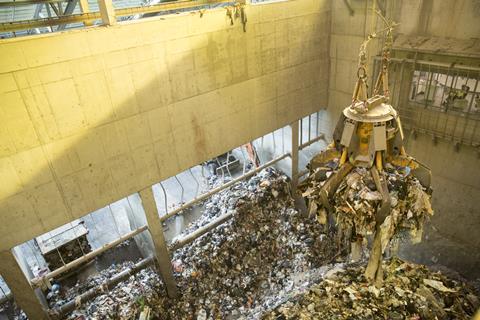- News

All the latest updates on building safety reformRegulations latest
- Focus
- Comment
- Programmes
- CPD
- Building the Future
- Jobs
- Data
- Subscribe
- Events

2024 events calendar
Explore now
Building Awards
Keep up to date
- Building Boardroom
Interserve: Waste not, want not

Interserve’s energy-from-waste crisis has prompted fears of another Carillion-style collapse, as the company takes drastic action to rebalance the books

For those with an eye on the small print, page 13 of Interserve’s 2017 results statement made for eye-watering reading. Between 2015 and 2017, the firm’s losses from its energy-from-waste business have rolled up to £216.6m – which works out at more than £70m a year. “It’s been a sobering experience,” says Gordon Kew, the boss of Interserve’s UK construction arm, which accounts for just under one-third of the firm’s total revenue.
Chief executive Debbie White must have been wondering what her predecessor Adrian Ringrose had got the business into when she took her up post at the beginning of last September. By October last year, less than two months after she joined, White recalculated that it would cost another £35m on top of Ringrose’s previously estimated £160m to pull the business out of the sector.
City watchdog the Financial Conduct Authority also wants to know why the cost kept jumping, last week announcing an investigation into the way the firm disclosed information over a seven-month period up to Ringrose’s announcement last February that the cost of getting out of the sector was going to be £160m.
“Having [energy-from-waste] as a separate business allowed me to run the rest of the [construction] business unencumbered”
Gordon Kew, Interserve
All this trouble has had a company-changing effect. It has forced a refinancing and heralded a major restructuring of the group.
Interserve is hardly alone in coming a cropper on a bad punt. Earlier this year, Galliford Try unveiled a rights issue to cover the expense of ballooning costs on its scheme to build a bypass around Aberdeen. So far it has raised £144m.
And back in 2013, steelwork contractor Severfield was forced into an emergency rights issue after seven problem jobs – notably its work on the Cheesegrater building in the City of London – saddled it with a company-threatening debt pile.
…
Already registered? Login here
To continue enjoying Building.co.uk, sign up for free guest access
Existing subscriber? LOGIN
Stay at the forefront of thought leadership with news and analysis from award-winning journalists. Enjoy company features, CEO interviews, architectural reviews, technical project know-how and the latest innovations.
- Limited access to building.co.uk
- Breaking industry news as it happens
- Breaking, daily and weekly e-newsletters
Get your free guest access SIGN UP TODAY

Subscribe now for unlimited access
Subscribe to Building today and you will benefit from:
- Unlimited access to all stories including expert analysis and comment from industry leaders
- Our league tables, cost models and economics data
- Our online archive of over 10,000 articles
- Building magazine digital editions
- Building magazine print editions
- Printed/digital supplements
Subscribe now for unlimited access.
View our subscription options and join our community

















